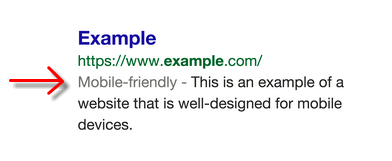
Google announced a few years back that their search engine would begin a major update affecting all sites not implementing mobile friendly Web design… and businesses were worried.
But what classifies as sufficiently “mobile-friendly” … according to Google?
Google’s 4 Mandatory Criteria for Mobile-Optimized Websites
Generally speaking, a mobile-optimized website is user-friendly on all devices: smartphones, tablets, PCs, etc. In order to be considered mobile-friendly by Google, your website must meet the following (4) specific criteria:
- Avoids software that is not common on mobile devices, like Flash
When your Web design adopts these criteria, it will be called out with a “mobile-friendly” label in searches done from mobile devices, to let searchers know your website will be user-friendly on their device.

Will Google Rankings Slip if Your Website Isn’t Mobile Optimized?
It’s possible. Notably though, this slip would only affect mobile search rankings, not rankings served in desktop search results.
Of course, your website has to have rankings in order for them to slip or be boosted by the change. This is important to note, because as with every major Google update, news of this update had website owners in a tizzy—and marketers took advantage.
Businesses were worried that their sites would be penalized by Google for not using mobile friendly Web design—but this was not necessarily the case.
While Google reported that the change would significantly impact search results in all languages worldwide, nowhere did they state that the change would unfold as a “penalty.”
This is not semantic quibbling; the point is that there isn’t literal evidence to support a ranking plummet as a result of this change. However, if Google will serve “more mobile-friendly websites in search results,” it does stand to reason that non-mobile optimized websites will be pushed lower than mobile-friendly ones.
Justifying the Hype:
How Important is Mobile Friendly Web Design?
From Google:
Have you ever tapped on a Google Search result on your mobile phone, only to find yourself looking at a page where the text was too small, the links were tiny, and you had to scroll sideways to see all the content? This usually happens when the website has not been optimized to be viewed on a mobile phone.
This can be a frustrating experience for our mobile searchers.
I’ll say. Google obviously thinks mobile-friendliness is vital. Even more importantly, so do your visitors.
How Your Users Feel:
10 Tweetable Statistics on the Importance of Mobile-Optimized Websites
[inlinetweet prefix=”” tweeter=”” suffix=””]In a study of 5,388 smartphone & tablet users, 48% complained that websites weren’t optimized for mobile devices.[/inlinetweet]
[inlinetweet prefix=”” tweeter=”” suffix=””]62% of companies that designed a website specifically for mobile had increased sales.[/inlinetweet]
[inlinetweet prefix=”” tweeter=”” suffix=””]54% of consumers agree that it’s easier to find info on mobile-optimized websites.[/inlinetweet]
[inlinetweet prefix=”” tweeter=”” suffix=””]67% of users are more likely to buy with a smartphone on mobile-friendly sites than non-mobile friendly.[/inlinetweet]
[inlinetweet prefix=”” tweeter=”” suffix=””]85% of adults think a company’s mobile website should be as good or better than their desktop site.[/inlinetweet]
[inlinetweet prefix=”” tweeter=”” suffix=””]63% of online adults are less likely to do business with a company via ANY channel after transaction problems on mobile.[/inlinetweet]
[inlinetweet prefix=”” tweeter=”” suffix=””]48% of users said if a site didn’t work well on their smartphone, they felt the company didn’t care about their business.[/inlinetweet]
[inlinetweet prefix=”” tweeter=”” suffix=””]88.5% of Alexa’s top ranking 100 websites are responsive.[/inlinetweet]
However, just any mobile friendly Web design will not do.
Mobile users favor both user-friendly design and speed:
[inlinetweet prefix=”” tweeter=”” suffix=””]66% of smartphone & tablet users are frustrated with page load times. Responsive design must also be fast & fluid.[/inlinetweet]
[inlinetweet prefix=”” tweeter=”” suffix=””]At peak traffic times, more than 75% of online consumers left for a competitor’s site rather than suffer delays.[/inlinetweet] Obviously, Google “compliance” is but one lone reason mobile friendly Web design is important for business growth. For our client websites, it has also helped reduce bounce rate, increase time spent on site (of course), and increase actions and engagement. According to the stats above, when your website works optimally on a user’s device, it increases your credibility, boosts user satisfaction with your brand, and can even increase sales.
So … Is Your Website Mobile-Friendly?
If you have to ask, then probably not. ;) But no need for speculation, just enter your URL into Google’s Mobile-Friendly Test tool below. If it isn’t mobile-optimized (or is partially or incorrectly optimized), the tool will quickly spit out a list of everything that needs to be fixed:
Test your website: https://www.google.com/webmasters/tools/mobile-friendly/
How did it do?
If it didn’t pass, we can help. Just zip me a quick note, including your Web address, and I’ll send back a no-frills quote to get your site mobile-compliant quickly.
Sources:
The Gomez Report,
Mobile Behavior Report
Mobile User Survey, Keynote,
User Experience Survey Report, February
Mobile Transactions Survey, Tealeaf, February
CodeItDown: Responsive Web Design in 2014: Stats and Trends
What Users Want Most From Mobile Sites Today, Google
Mobile User Preferences, Habits, and Expectations Keynote Competitive Research Keynote Proprietary


Have you ever thought about publishing an ebook or guest
authoring on other blogs? I have a blog centered on the same ideas you discuss and would love
to have you share some stories/information. I know my
readers would enjoy your work. If you’re even remotely interested,
feel free to shoot me an e-mail.